
The Kingdom of Warri, Warri Kingdom or Iwere Kingdom, was established in 1480, was part of the Nigerian traditional states its ancestral capital is based in Ode-Itsekiri, Warri South LGA, Delta State, Nigeria with a palace erected in 1950s in the heart of the city of Warri, Warri South LGA, Delta State, Nigeria.
Ayiri Emami is a Nigerian businessman, politician, and philanthropist, the chairman and chief executive officer of A & E group, a company with investments in oil and gas, construction, haulage, entertainment and the hospitality industry.

Erejuwa II was a Nigerian traditional title holder and paramount leader of the Itsekiri who was Olu of Warri from 1951 to 1964 and from 1966 to 1986. He was the 18th Olu of Warri Kingdom with the title Ogiame Erejuwa II. He succeeded his father Ginuwa II as Olu. Ginuwa II was a great grandson of Olu Akengbuwa the last Olu who died in 1848, he was crowned in 1936 after an interregnum that lasted 88 years when Warri's political leadership was dominated by merchant princes.
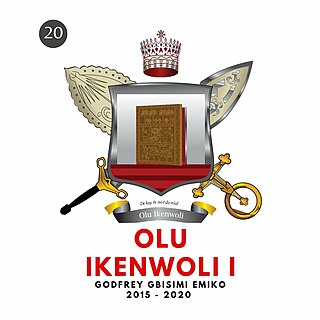
Ikenwoli Godfrey Emiko was a Nigerian traditional ruler.
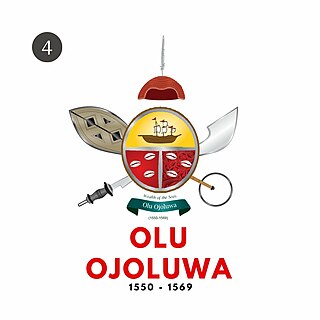
Olu Ojoluwa was an Itsekiri traditional ruler. He succeeded his father Ogiame, Olu Irame after his demise. He was crowned Ogiame Ojoluwa, the 4th Olu of Warri Kingdom at Ode-Itsekiri, the ancestral home of the Itsekiri. Olu Ojoluwa reigned for about nineteen years from about 1550 to 1569. During his reign, he commenced the process of integration of Ekpen's (Ekpenede) descendants of Okere with the local population in the kingdom.
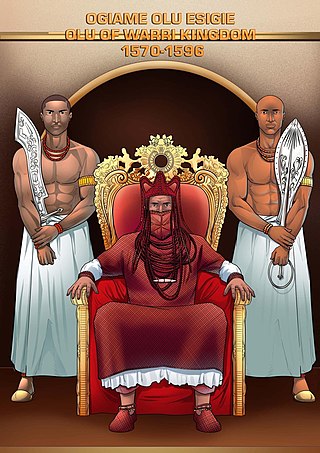
Olu Esigie was an Itsekiri traditional ruler. He succeeded his father Ogiame, Olu Ojoluwa after his demise. He was crowned Ogiame Esigie, the 5th Olu of Warri Kingdom at Ode-Itsekiri, the ancestral home of the Itsekiri. He ascended the throne of his father in 1570 and reigned until 1597, when he passed on. He was succeeded by his son, Olu Atorongboye.

Olu Atuwatse I was the 7th Olu of Warri who ruled over the Warri Kingdom. He was the son to Olu Atorongboye and succeeded his father Olu Atorongboye as the 7th Olu of Warri. He was initially home-schooled by his father and the Bishop in Ode-Itsekiri, which resulted in his ability to read and write in Portuguese. He was educated in Portugal from 1600 to 1611. He returned to Warri Kingdom as a graduate, making him the first graduate in Sub Saharan Africa Olu Dom Domingos was the second Christian Olu to rule Warri Kingdom. He married a Portuguese noblewoman, Maria Pereira, before returning to Nigeria with her in 1611.
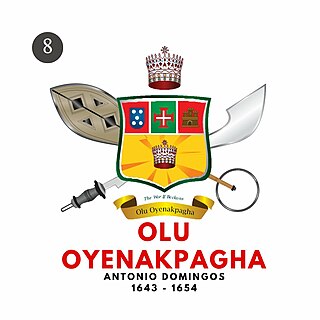
Olu Oyenakpagha was the 8th Olu of Warri who ruled over the Itsekiri people. He was named Omonighenren which translates to Prince with the golden skin. On ascension to the throne as Ogiame, Olu of Warri Kingdom, he was named Obanighenren which translates to King with the golden skin. His other name was Don Antonio Domingos. He was the son to Olu Atuwatse I and succeeded his father as the 8th Olu of Warri. He wrote a letter to Pope Clement X in 1652 which was delivered to the Pope successfully. He was educated at home and at an institute in Angola. Like his father, he married a Portuguese noblewoman. His son Olu Omoluyiri succeeded him.
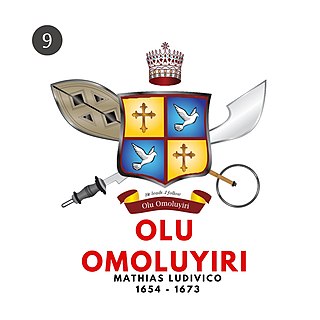
Olu Omoluyiri was the 9th Olu of the medieval Nigerian Warri kingdom who ruled over the Itsekiri and non Itsekiri people in the kingdom. He was the brother to Olu Oyenakpagha, the 8th Olu of Warri Kingdom and the son to Olu Atuwatse I, the 7th Olu of Warri. He succeeded his brother, Olu Oyenakpagha as the 9th Olu of Warri. His Portuguese name was Mathias Ludivico. He married a Portuguese noblewoman and was succeeded by his son Olu Abejoye.
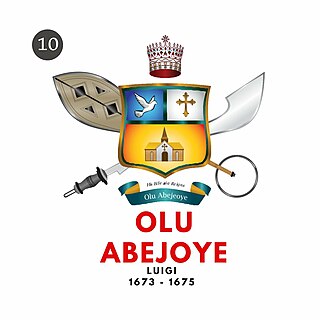
Olu Abejoye was the 10th Olu of Warri who ruled over the Itsekiri and non Itsekiri people in the kingdom. He was the son to Olu Omoluyiri, the 9th Olu of Warri Kingdom. He succeeded his father, Olu Omoluyiri as the 10th Olu of Warri. His Portuguese name was Luigi. He married a Portuguese noblewoman and was succeeded by his son Olu Akenjoye.
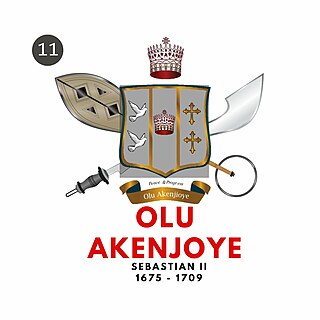
Olu Akenjoye was the 11th Olu of Warri who ruled over the Itsekiri and non Itsekiri people in the kingdom. He was the son to Olu Abejoye, the 10th Olu of Warri Kingdom. He succeeded his father as the 11th Olu of Warri. He took the title, Ogiame Sebastian II. He was succeeded by his son Olu Omagboye (Miguel).

Olu Omagboye was the 12th Olu of Warri who ruled over the Kingdom of Warri. He succeeded his father, Olu Akenjoye as the 12th Olu of Warri. He took the title, Ogiame Omagboye. His son Olu Akengboye succeeded him.

Olu Akengboye was the 13th Olu of Warri who ruled over the Kingdom of Warri. He succeeded his father, Olu Omagboye (Miguel) as the 13th Olu of Warri. He took the title, Ogiame Akengboye. His Portuguese name was Agostinho Sabastiao Octobia. His son Olu Atogbuwa succeeded him around 1734.

Olu Atogbuwa was the 14th Olu of Warri who ruled over the Kingdom of Warri. He succeeded his father, Olu Akengboye as the 14th Olu of Warri. He took the title, Ogiame Atogbuwa. His Portuguese name was Manuel Octobia. When he went to be with his fathers, he was succeeded by Olu Erejuwa I around 1760.

Olu Erejuwa was the 15th Olu of Warri who ruled over the Kingdom of Warri. He succeeded Olu Atogbuwa as the 15th Olu of Warri. He took the title, Ogiame Erejuwa I. His Portuguese name was Sebastiao Manuel Octobia. When he went to be with his fathers, he was succeeded by Olu Akengbuwa around 1795.

Olu Akengbuwa was the 16th Olu of Warri who ruled over the Kingdom of Warri. He succeeded his father Olu Erejuwa I as the 16th Olu of Warri. He took the title, Ogiame Akengbuwa. He was also called Eyeolusan Joao. When he went to be with his fathers, there was a period of crisis following the death to the potential successors which was followed by a period of political Interregnum. His son Prince Oritsemone left Ode-Itsekiri during the period of the crisis to form Usele Community.

Olu Ginuwa II was a Nigerian traditional title holder and paramount leader of the Itsekiri who was Olu of Warri from 1936 to 1949. He was the 17th Olu of Warri Kingdom with the title Ogiame Ginuwa II. He was born Emiko Ikengbuwa. He succeeded his grandfather Olu Akengbuwa as Olu of Warri after an interregnum that lasted 88 years when Warri's political leadership was dominated by merchant princes.
Ode-Itsekiri is a community in Warri South Local Government Area of Delta State, Nigeria. It is also called Itsekiri-Olu and Big Warri. It is the capital of the Itsekiri people and one of the first autonomous communities before the crowning of the Olu Ginuwa. It existed long before 1480, with exact data not known. The Olu's Palace in Ode-Itsekiri has always been used to crown the Olu of Warri Kingdom, while the Kings are buried at Ijala-Ikenren Community.

Ogiame Atuwatse III is a Nigerian traditional king of the Kingdom of Warri in the Delta State. He was born Utieyinoritsetsola Emiko, also known as Tsola Emiko, on April 2, 1984 to Olu Atuwatse II, the 19th Olu of Warri, and Gladys Durorike Emiko. He is also a descendant of Olu Akengbuwa.
Ureju Community is an indigenous Itsekiri rural community in the Warri Kingdom. Ureju Community is one of the aboriginal five communities that make up the Warri Kingdom before the coming of Olu Ginuwa I alongside other Itsekiri communities like Ugborodo, Ode-Itsekiri (Okotomu-Irigbo), Inorin and Omadino. It is located in the Benin River axis of Warri North Local Government Area of present-day Delta State, Nigeria. Ureju Community has two main families - Olero and Kokolo.

















